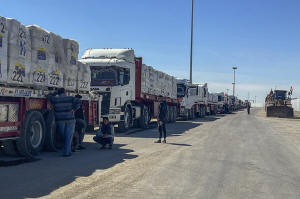Israel is criticized after it bars Gaza aid to pressure Hamas to accept
a new ceasefire proposal
[March 03, 2025]
By TIA GOLDENBERG and SAMY MAGDY
TEL AVIV, Israel (AP) — Israel faced sharp criticism as it stopped the
entry of all food and other supplies into Gaza on Sunday and warned of
“additional consequences” for Hamas if a fragile ceasefire isn't
extended.
Mediators Egypt and Qatar accused Israel of violating humanitarian law
by using starvation as a weapon.
The ceasefire's first phase saw a surge in humanitarian aid after months
of growing hunger. Hamas accused Israel of trying to derail the next
phase Sunday hours after its first phase had ended and called Israel's
decision to cut off aid “a war crime and a blatant attack” on a truce
that took a year of negotiations before taking hold in January.
In the second phase, Hamas would release dozens of remaining hostages in
return for an Israeli pullout from Gaza and a lasting ceasefire.
Negotiations on the second phase were meant to start a month ago but
haven't begun.
Israel backs a new proposal to speed up the release of hostages
Israel said Sunday that a new U.S. proposal calls for extending the
ceasefire through Ramadan — the Muslim holy month that began over the
weekend — and the Jewish Passover holiday, which ends April 20.
Under that proposal, Hamas would release half the hostages on the first
day and the rest when an agreement is reached on a permanent ceasefire,
Israeli Prime Minister Benjamin Netanyahu said. The militants currently
hold 59 hostages, 35 of them believed to be dead.

National Security Council spokesman Brian Hughes said the United States
would support whatever decision Israel makes, without commenting on the
new proposal. Netanyahu said Israel is fully coordinated with the Trump
administration and the ceasefire will only continue as long as Hamas
keeps releasing hostages.
The UN and others warn against aid cutoff
Saying the ceasefire has saved countless lives, the International
Committee of the Red Cross said that “any unraveling of the forward
momentum created over the last six weeks risks plunging people back into
despair.”
U.N. humanitarian chief Tom Fletcher called Israel’s decision
“alarming," noting that international humanitarian law makes clear that
aid access must be allowed.
U.N. Secretary-General António Guterres urged all parties to make every
effort to prevent a return to hostilities in Gaza, and called for
humanitarian aid to flow back into Gaza immediately and for the release
of all hostages, said spokesman Stéphane Dujarric.
Five non-governmental groups asked Israel’s Supreme Court for an interim
order barring the state from preventing aid from entering Gaza, claiming
the move violates Israel’s obligations under international law: “These
obligations cannot be condition on political considerations.”
The war has left most of Gaza’s population of over 2 million dependent
on international aid. About 600 aid trucks had entered daily since the
ceasefire began on Jan. 19, easing fears of famine raised by
international experts.
[to top of second column]
|

Trucks line up at the Egyptian side of the Rafah border crossing
between Egypt and the Gaza Strip after Israel blocked the entry of
aid trucks into Gaza, Sunday, March 2, 2025. (AP Photo/Mohamed
Arafat)

But residents said prices shot up as word of the closure spread.
From the heavily destroyed Jabaliya urban refugee camp, Fayza Nassar
said the closure would worsen dire conditions.
“There will be famine and chaos,” she said.
Hamas warned that any attempt to delay or cancel the ceasefire
agreement would have “humanitarian consequences” for the hostages.
The only way to free them is through the existing deal, the group
said.
Families of hostages again pressed Israel's government.
“Postponing the negotiation on the deal for everyone’s (release)
can’t happen," Lishay Miran-Lavi, wife of hostage Omri Miran, said
in Tel Aviv. “Hostages don’t have time to wait for an ideal deal.”
Israel was accused of blocking aid throughout the war
Israel imposed a siege on Gaza in the war’s opening days and only
eased it under U.S. pressure. U.N. agencies and aid groups accused
Israel of not facilitating enough aid during 15 months of war.
The International Criminal Court said there was reason to believe
Israel had used “starvation as a method of warfare” when it issued
an arrest warrant for Netanyahu last year. The allegation is also
central to South Africa’s case at the International Court of Justice
accusing Israel of genocide.
Israel has denied the accusations. It says it has allowed in enough
aid and blamed shortages on what it called the U.N.’s inability to
distribute it. It also accused Hamas of siphoning off aid — an
allegation that Netanyahu repeated Sunday.
Kenneth Roth, former head of Human Rights Watch, said Israel as an
occupying power has an “absolute duty” to facilitate humanitarian
aid under the Geneva Conventions, and called Israel’s decision “a
resumption of the war-crime starvation strategy” that led to the ICC
warrant.
The war began when Hamas-led militants stormed into southern Israel
on Oct. 7, 2023, killing some 1,200 people, mostly civilians, and
taking 251 hostage.
Israel’s offensive has killed over 48,000 Palestinians, according to
Gaza’s Health Ministry. It says more than half of those killed were
women and children. It does not specify how many of the dead were
combatants.
Israeli bombardment pounded large areas of Gaza to rubble and
displaced some 90% of the population.
All contents © copyright 2025 Associated Press. All rights reserved
 |